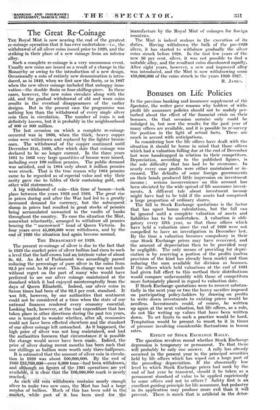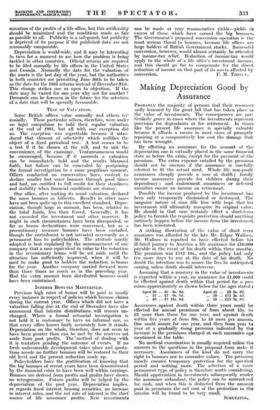Bonuses on Life Policies
IN the previous banking and insurance supplement of tliC Spectator, the writer gave reasons why holders of with: profit life assurance policies should not be unduly per'- turbed about the effect of the financial crisis on their bonuses. On that occasion surmise only could be indulged in, but now the results for the past year of many offices are available, and it is possible to re-survey the position in the light of actual facts. These arc much in accord with anticipations.
In considering how the life offices have dealt with the situation it should be borne in mind that those offices which had a valuation falling due at the end of December last were handicapped in relation to their competitors. Depreciation, according to the published figures, is the sole difficulty that has had to be overcome. In nearly every case profits were either maintained or in- creased. The defaults of some foreign governments on their bonds produced little iinpression on Investment income ; serious inconvenience on this account has been obviated by the wide spread of life assurance invest- ments. A different tale about investment inecan,e might have had to be told if the assets had comprised a large proportion of ordinary shares. The fall in Stock Exchange quotations is the factor that has upset bonus calculations, but the fall can be ignored until a complete valuation of assets and liabilities has to be undertaken. A valuation is obli- gatory every fifth year, so that those offices which have held a valuation since the end of 1926 were not compelled to have an investigation in December last. By the time a valuation becomes compulsory in their case Stdck Exchange prices may have recovered, and the amount of depreciation then to be provided may be negligible. The only means of providing for depre- ciation is by reserving a portion of the profits (unless provision of the kind has already been made) and thus reducing the sum available for division as bonuses. If the offices which held valuations at the end of 1931 had given full effect to this method their distributions would compare unfavourably with those of competitors more fortunately placed in regard to valuation date. If Stock Exchange quotations were to recover substan- tially in the next year or two the heavy sacrifice imposed on participating policy-holders by drawing on profits to write down Investments to existing prices would be ' needless. • Investments could, of course, ,be written up again at the next valuation, but life offices, as a rule, do not like writing up values that have been written down. To set limits to such a practice would be hard. Temptation would be present, to resort to it in times of pressure involving considerable fluctuations in bonus rates.
EFFECT OF STOCK EXCHANGE RALLY.
The question revolves round whether Stock, Exchange depression is temporary or permanent. To that there will probably be only one answer. A rally has already occurred in the present year in the principal securities held by life offices Which' has wiped out a large part of the preceding • depreciation., If the abnormally low level to which Stock Exchange prices had sunk by the end of last year be transient, -should it be taken as a permanent standard of value to be applied capriciously to some offices and not to others ? Safety first is an excellent guiding principle for life assurance, but pedantry i
. in ts application may produce more evil than it will
prevent. There is much that is artificial in the deter.
mination of the profits of a life office, but this artificiality should be minimized and the conditions made as fair. as possible to all. Publicity is a safeguard, but publicity is deprived of its purpose if the published data are not reasonably comparable.
Depreciation is world-wide, and it may be interesting to turn for a moment to see how.the problem is being tackled in other countries. Official returns are required to be filed annually by life offices in the United States and Canada. - Normally the date for the valuation of the assets is the last day of the year, but the authorities in both countries are permitting June 30th to be taken as the date for the 1931 returns instead of December 81st. This change strikes one as open to objection. If the date may be varied for one year why not for another ? Demands can be foreseen in the future for the selection of a date that will be specially favourable.
TEST OF VALUATION.
Some British offices value annually and others tri- ennially. These particular offices, therefore, were under no legal compulsion to hold their regular valuation at the end -of 1931, but all with one • exception did so. The exception was regrettable because it intro- duced that element of selectivity which nullifies the object of a fixed periodical test. A test ceases to be a test if it be chosen at the will, and to suit the convenience, of the examinee. Venturesomeness would be encouraged, because if it succeeds a valuation can be immediately held and the results blazoned forth, but failure can be concealed by postpOning the formal investigation to a more propitious moment. Offices conducted on conservative lines, content to declare smaller but surer bonuses through good times and bad, are entitled to full credit for their steadiness and stability when financial conditions are stormy.
One office, after making its usual valuation, declared the same bonuses as hitherto. Results in other cases have not been quite up to this excellent standard. Depre- ciation, though large in amount, has been, relative to the total funds, less than feared. Generally, it has not exceeded the investment and other reserves. It might in such circumstances have been disregarded, so far as bonus declarations were concerned, but as a precautionary measure bonuses have been curtailed, though the curtailment is not intended necessarily as a permanent loss to polieyholdets.- The attitude mostly adopted is best explained by the announcement of one company that a sum equivalent-in value to the reduction in the reversionary bonus will be set aside until; the situation has suiTiciently improved, when it will be used to make good to holden the reduction - in bonus for the year. Another company carried forward /nom than three times as much as in the preceding year. Had the extra amount been distributed bonuses could have been maintained.
INTERIM BONUSES MAINTAINED. •
Previous high rates of bonus will be paid in nearly every instance in respect of policies which become claims during the current year. Offices which did not have a valuation falling due at the end of December have also announced that. interim distributions.. will remain un- changed. Where a formal actuarial investigation is not held it is customary to have an informal one, so that every office knows fairly accurately how it stands. Depreciation on the whole, therefore, .,does pot seem to have been greater than can be met by the reserves set aside from past profits. The• method of dealing with it is tentative pending the outcome .of 'events. If no fresh unfavourable development takes place and quota- tions recede no further bonuses will be restored to their old level and the present reduction made up.
Policyholders have the gratification Of knowing that the big bonuses of recent,years have been demonstrated by the financial crisis to have been well 'within earnings. Bonuses are derived from profits and. profits:have shown no retrogression.. Future profits will be helped by the depreciation - of the past year. Depreciation implies, as regards fixed interest bearing securities, an increase in interest rates, and the net rate of interest is the chief source of life assurance profits. New investments can be made at very remunerative yields—yields in excess of those which have earned the big bonuses. The Government's proposed conversion operation is the most serious threat to bonuses, because life offices are large holders of British Government stoeks. Successful conversion, however, would :almost certainly be attended by income-tax relief. Reduction of income-tax would apply to the whole of a life office's investment income, and this should go far to compensate for the direct reduction of income on that part of its assets affected by



















































 Previous page
Previous page